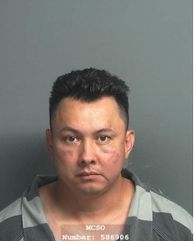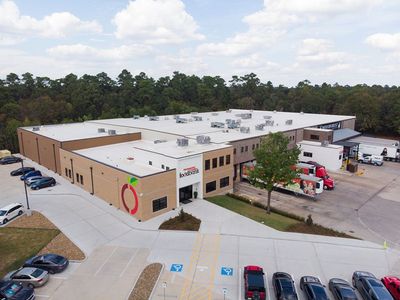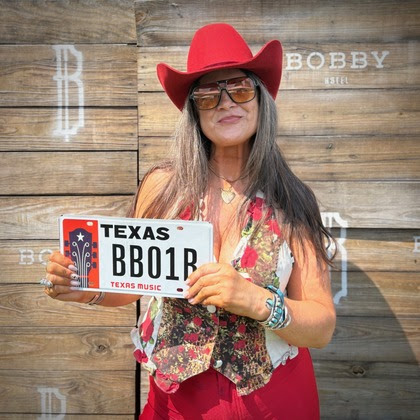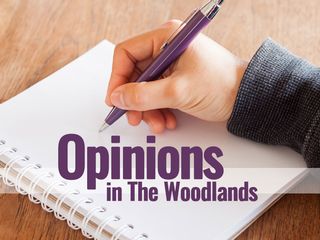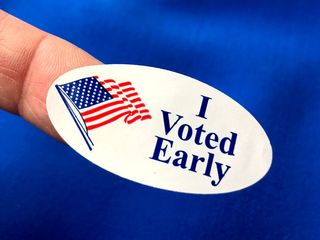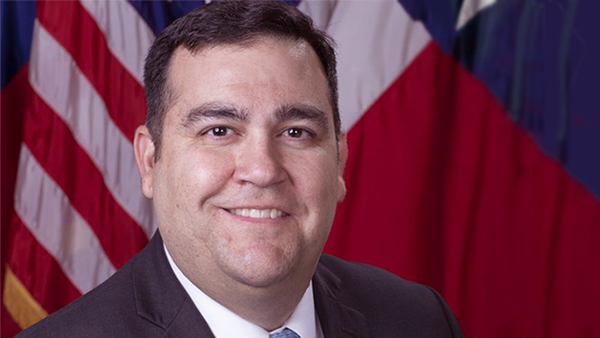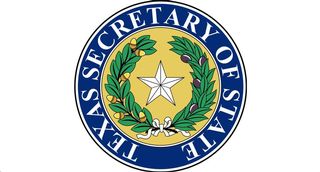- Sections :
- Crime & Public Safety
- Restaurants & Food
- Sports
- More
Categories
A History of Faith: A look at a Local Legal Case with National Significance Involving Justice of The Peace, Judge Wayne Mack
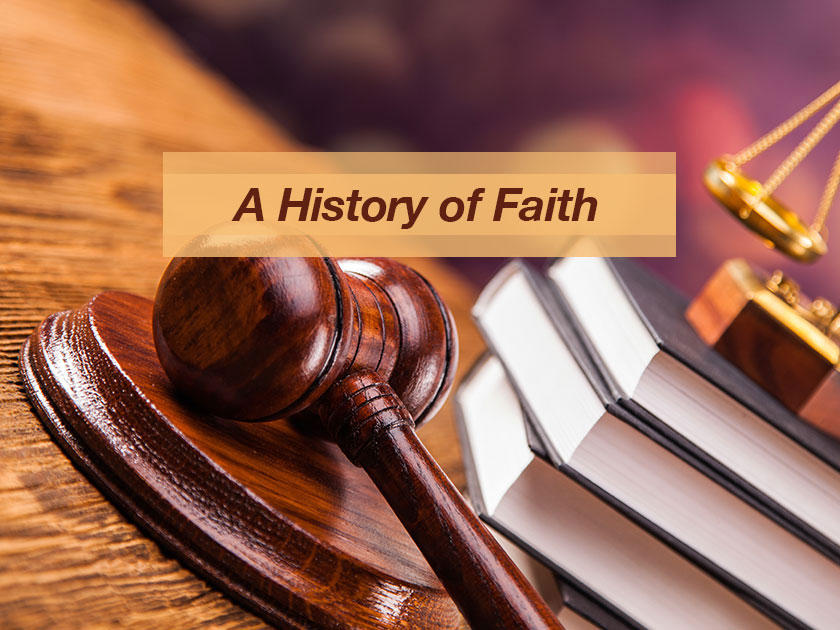
THE WOODLANDS, TX — Many people in Montgomery County are probably not aware of the fact that there is an ongoing legal case regarding a local chaplaincy program and practice of giving invocations at the opening of court sessions. The case involves Montgomery County Precinct 1, Justice of the Peace, Wayne Mack. Judge Mack was elected in 2014 and has served in this capacity for the past 7 years. Regardless of how you lean regarding the case itself, the legal ramifications of this process will undoubtably reach beyond our local community with a significant national impact. We sat down with Judge Wayne Mack to talk about the roles of Texas justices of the peace, chaplaincy programs in general and the ongoing case he is involved in. His case highlights faith and religion, but at its core, it also involves a fight for individual rights and freedoms of every individual with respect to how they practice their freedom in their communities.
What does a Justice of the Peace do?
If we asked the average person what a justice of the peace does for the community, they would probably respond by saying that the main task of a justice of the peace is to conduct marriage ceremonies. This is one duty of a justice of the peace, but they also perform an array of other functions in the community as well. The following are some typical duties of a Texas Justice of the peace. Their court is sometimes referred to as “The Peoples Court”. In the course of their job, they may -
* Hear traffic and other Class C misdemeanor cases punishable by fine only including traffic tickets, penal code offenses, and hot checks.
* Hear civil cases with up to $20,000 in controversy
* Hear landlord and tenant disputes
* Enforce certain county and state ordinances
* Deal with juvenile matters including truancy, alcohol and tobacco violations, and shoplifting.
* Perform magistrate duties
* Conduct inquests
* Perform marriages
* Issue warrants for search and arrest
* Conduct preliminary hearings
* Administer oaths
* Handle emergency protective orders
We asked Judge Wayne Mack about normal Texas justice of the peace duties and in addition to the tasks listed above, in many cases, the county justice of the peace also acts as the county coroner. Judge Mack mentioned that there are 254 counties in the state of Texas and only 16 counties have medical examiner’s offices. That means that the vast majority of Texas is served under the coroner system involving the precinct’s justice of the peace.
About Judge Wayne Mack
Judge Mack has held the position of Precinct 1 Justice of The Peace for over 7 years. Before he served as justice, he served the community in various other capacities. Judge Mack said that he started out as a custodian with Montgomery County in 1986. He joked about what he would put in his memoirs, saying that he went “from janitor to judge” and how he had a lot of crud to clean up in between. He worked hard as a custodian and never viewed himself as just a custodian. His hard work paid off and he was eventually promoted to other positions in the county that included being named director of that department in 1995. He was also a police officer having served 10 years as a sergeant at the Conroe Police Department. In addition to serving as sergeant, he served 5 years with the Montgomery County Precinct 1 Constable’s Office, two of those years serving as a reserve deputy constable.
About Judge Wayne Mack’s Chaplaincy Program
We asked Judge Mack to explain when and why he started his local chaplaincy program as well as what their function was. He replied -
“When I was running for office, I knew that our county did not have a chaplaincy program, so I ran with the idea of possibly starting one. Then later I was elected to this office. Just a few days into this position I realized that there was a great need for a chaplaincy program. We had talked to several local pastors that had committed in the area to be a part of this program and then in June of that year, there was a terrible situation with a young lady that had died on I-45 and 20 of her friends had witnessed that death. It was one of those programs I wanted to develop on a large scale, and addressing those types of situations was my main motivation. On a Sunday night, I couldn't get ahold of the hospital chaplain. He wasn't available and no one was answering their phones. That situation really catapulted us into starting a new chaplaincy program. We sent an invitation to the faith community and we reached out to every faith, every mosque, temple, synagogue and church you can imagine. As a result of that, we literally have every mosque, temple and synagogue as well as every church you could imagine represented. We have over 60 chaplains and three to four of those chaplains are on call 24 hours a day, 7 days a week. They are not only available if I call for them but also are available for law enforcement as well. Law enforcement uses them to take them on death notifications when we get to a scene, and a family gets the worst news of their life. They are able to call for a chaplain to come there and chaplaincy is just being there to bring peace to the storm, and they are there to just be with the family. It gives the ability for our law enforcement on scene to conduct our investigations, and the chaplains help take care of the family and meet their needs. Those are very terrible, chaotic situations, whether it's the homicide, suicide, traffic fatality or just the unexpected natural death. Psychologists tell us that the quicker the families can be given hope regarding the situation, the less likelihood that somebody is going to have a post traumatic stress event from the trauma. It helps families with that grieving process, grief and trauma, with those kinds of events as you can only imagine is overwhelming.”
The role of chaplains in our community is such a great service. The purpose of these programs is to offer help to the local community in addressing overwhelming traumatic events. To help start the healing process and to stem post traumatic stress. Judge Wayne Mack saw the need for this service and helped assemble 60 faith leaders from a cross-section of faith organizations.
Judge Mack went on to tell us how he started this program.
“We looked at chaplaincy programs across the nation, really, in searching out how to form one, and there was never one in this region at this level, or that had this capability or bandwidth so we put a great deal of effort and research into what the best practices were and so forth. May of 2014 is when we started the concept of it and we had some buy in. But it wasn't until that situation with the lady that died on I-45 that we pushed it to the next level, so July of 2014 is when we made a very public ask and wanted to have a bigger program that could help not just in our precinct but across the county. Every chaplain is from the Montgomery County area.”
In addition to the services that the chaplains provided for the area, Judge Wayne Mack also allowed the chaplains to open his court sessions with an invocation. These are 60 chaplains representing every faith in the county, offering an invocation to help solemnize the occasion. Our country has a long history of court invocations and Judge Wayne Mack continues in that tradition.
Public invocations have been a part of our history from the founding of our country
Many of the founding fathers were men of faith and most public meetings were opened with an invocation. The Continental Congress opened with prayer. The Supreme Court also opens with a prayer as does the United States Congress. The Texas senate and Texas house both open their sessions with a prayer. The ability to exercise religious freedom was included in the United States Constitution. Local invocations are an extension of that long standing tradition.
About The Invocation and Chaplaincy Legal Dispute
In September of 2014, the year Judge Wayne Mack started his role as Justice of the Peace and his chaplaincy program was started, a judicial conduct violation was filed against him. This lawsuit was focused on Wayne Mack’s inclusion of invocations being voiced before each court session. The chaplain group is made of up volunteers and to honor their efforts, Judge Mack invites them to solemnize the court proceedings, which is often done through a short invocation. There were actually three suits that were brought against the invocations. The first two suits were ruled in favor of Judge Wayne Mack. The last decision on May 21, 2021 ruled against him. The latest ruling is being appealed in the 5th Circuit Court of Appeals in New Orleans.
We asked about the significance of this case and if it could eventually become a precedent setting case affecting the actions of future justices of the peace in creating similar chaplaincy programs. Because Judge Mack is following a long tradition of opening courts, including the Supreme Court with a ceremonial invocation, if the court decision currently in place is allowed to stand, it would serve to negate the practice of many other people and groups around the country. The opposite could also be true if the ceremonial invocation is allowed to go forward. It would not be a problem for other justices of the peace, judge’s courts, county commissioners, etc, to be able to do the same thing. In fact, just two years ago, our courts held a case called American Legion versus American Humanist Association, that this type of behavior and long standing tradition of religious practice with religious symbols and religious language on public property, that they bear a strong presumption of constitutionality as the Supreme Court said, and they are looking at this circuit court to say “did this report actually mean it when they said that”. They said that they think they did mean it, and that should protect Judge Mack. They believe it should protect not only Judge Mack, but hopefully will protect many others around the country as well.
We asked Judge Mack how the May 21 ruling affects the invocations being offered before his court sessions. He said that “Our legal team petitioned the 5th District Court of Appeals in New Orleans for a temporary stay and they granted it, pending our appeal of the original court order”
What does a Justice of the Peace do?
If we asked the average person what a justice of the peace does for the community, they would probably respond by saying that the main task of a justice of the peace is to conduct marriage ceremonies. This is one duty of a justice of the peace, but they also perform an array of other functions in the community as well. The following are some typical duties of a Texas Justice of the peace. Their court is sometimes referred to as “The Peoples Court”. In the course of their job, they may -
* Hear traffic and other Class C misdemeanor cases punishable by fine only including traffic tickets, penal code offenses, and hot checks.
* Hear civil cases with up to $20,000 in controversy
* Hear landlord and tenant disputes
* Enforce certain county and state ordinances
* Deal with juvenile matters including truancy, alcohol and tobacco violations, and shoplifting.
* Perform magistrate duties
* Conduct inquests
* Perform marriages
* Issue warrants for search and arrest
* Conduct preliminary hearings
* Administer oaths
* Handle emergency protective orders
We asked Judge Wayne Mack about normal Texas justice of the peace duties and in addition to the tasks listed above, in many cases, the county justice of the peace also acts as the county coroner. Judge Mack mentioned that there are 254 counties in the state of Texas and only 16 counties have medical examiner’s offices. That means that the vast majority of Texas is served under the coroner system involving the precinct’s justice of the peace.
About Judge Wayne Mack
Judge Mack has held the position of Precinct 1 Justice of The Peace for over 7 years. Before he served as justice, he served the community in various other capacities. Judge Mack said that he started out as a custodian with Montgomery County in 1986. He joked about what he would put in his memoirs, saying that he went “from janitor to judge” and how he had a lot of crud to clean up in between. He worked hard as a custodian and never viewed himself as just a custodian. His hard work paid off and he was eventually promoted to other positions in the county that included being named director of that department in 1995. He was also a police officer having served 10 years as a sergeant at the Conroe Police Department. In addition to serving as sergeant, he served 5 years with the Montgomery County Precinct 1 Constable’s Office, two of those years serving as a reserve deputy constable.
About Judge Wayne Mack’s Chaplaincy Program
We asked Judge Mack to explain when and why he started his local chaplaincy program as well as what their function was. He replied -
“When I was running for office, I knew that our county did not have a chaplaincy program, so I ran with the idea of possibly starting one. Then later I was elected to this office. Just a few days into this position I realized that there was a great need for a chaplaincy program. We had talked to several local pastors that had committed in the area to be a part of this program and then in June of that year, there was a terrible situation with a young lady that had died on I-45 and 20 of her friends had witnessed that death. It was one of those programs I wanted to develop on a large scale, and addressing those types of situations was my main motivation. On a Sunday night, I couldn't get ahold of the hospital chaplain. He wasn't available and no one was answering their phones. That situation really catapulted us into starting a new chaplaincy program. We sent an invitation to the faith community and we reached out to every faith, every mosque, temple, synagogue and church you can imagine. As a result of that, we literally have every mosque, temple and synagogue as well as every church you could imagine represented. We have over 60 chaplains and three to four of those chaplains are on call 24 hours a day, 7 days a week. They are not only available if I call for them but also are available for law enforcement as well. Law enforcement uses them to take them on death notifications when we get to a scene, and a family gets the worst news of their life. They are able to call for a chaplain to come there and chaplaincy is just being there to bring peace to the storm, and they are there to just be with the family. It gives the ability for our law enforcement on scene to conduct our investigations, and the chaplains help take care of the family and meet their needs. Those are very terrible, chaotic situations, whether it's the homicide, suicide, traffic fatality or just the unexpected natural death. Psychologists tell us that the quicker the families can be given hope regarding the situation, the less likelihood that somebody is going to have a post traumatic stress event from the trauma. It helps families with that grieving process, grief and trauma, with those kinds of events as you can only imagine is overwhelming.”
The role of chaplains in our community is such a great service. The purpose of these programs is to offer help to the local community in addressing overwhelming traumatic events. To help start the healing process and to stem post traumatic stress. Judge Wayne Mack saw the need for this service and helped assemble 60 faith leaders from a cross-section of faith organizations.
Judge Mack went on to tell us how he started this program.
“We looked at chaplaincy programs across the nation, really, in searching out how to form one, and there was never one in this region at this level, or that had this capability or bandwidth so we put a great deal of effort and research into what the best practices were and so forth. May of 2014 is when we started the concept of it and we had some buy in. But it wasn't until that situation with the lady that died on I-45 that we pushed it to the next level, so July of 2014 is when we made a very public ask and wanted to have a bigger program that could help not just in our precinct but across the county. Every chaplain is from the Montgomery County area.”
In addition to the services that the chaplains provided for the area, Judge Wayne Mack also allowed the chaplains to open his court sessions with an invocation. These are 60 chaplains representing every faith in the county, offering an invocation to help solemnize the occasion. Our country has a long history of court invocations and Judge Wayne Mack continues in that tradition.
Public invocations have been a part of our history from the founding of our country
Many of the founding fathers were men of faith and most public meetings were opened with an invocation. The Continental Congress opened with prayer. The Supreme Court also opens with a prayer as does the United States Congress. The Texas senate and Texas house both open their sessions with a prayer. The ability to exercise religious freedom was included in the United States Constitution. Local invocations are an extension of that long standing tradition.
About The Invocation and Chaplaincy Legal Dispute
In September of 2014, the year Judge Wayne Mack started his role as Justice of the Peace and his chaplaincy program was started, a judicial conduct violation was filed against him. This lawsuit was focused on Wayne Mack’s inclusion of invocations being voiced before each court session. The chaplain group is made of up volunteers and to honor their efforts, Judge Mack invites them to solemnize the court proceedings, which is often done through a short invocation. There were actually three suits that were brought against the invocations. The first two suits were ruled in favor of Judge Wayne Mack. The last decision on May 21, 2021 ruled against him. The latest ruling is being appealed in the 5th Circuit Court of Appeals in New Orleans.
We asked about the significance of this case and if it could eventually become a precedent setting case affecting the actions of future justices of the peace in creating similar chaplaincy programs. Because Judge Mack is following a long tradition of opening courts, including the Supreme Court with a ceremonial invocation, if the court decision currently in place is allowed to stand, it would serve to negate the practice of many other people and groups around the country. The opposite could also be true if the ceremonial invocation is allowed to go forward. It would not be a problem for other justices of the peace, judge’s courts, county commissioners, etc, to be able to do the same thing. In fact, just two years ago, our courts held a case called American Legion versus American Humanist Association, that this type of behavior and long standing tradition of religious practice with religious symbols and religious language on public property, that they bear a strong presumption of constitutionality as the Supreme Court said, and they are looking at this circuit court to say “did this report actually mean it when they said that”. They said that they think they did mean it, and that should protect Judge Mack. They believe it should protect not only Judge Mack, but hopefully will protect many others around the country as well.
We asked Judge Mack how the May 21 ruling affects the invocations being offered before his court sessions. He said that “Our legal team petitioned the 5th District Court of Appeals in New Orleans for a temporary stay and they granted it, pending our appeal of the original court order”
Comments •

